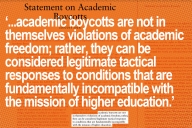You have /5 articles left.
Sign up for a free account or log in.
A University of Denver professor plans to teach the same course next spring on the domestic and international consequences of the drug war that led to two anonymous student complaints, resulting in his being suspended this year for more than 100 days. The complaints centered on a few sexual references that civil liberties groups say were completely harmless and should never have led to any action being taken against the professor.
Following the suspension, the course was taught by three other instructors, including a graduate student.
That decision by university administrators against Arthur N. Gilbert, associate professor at the Josef Korbel School of International Studies, is now the focus of an inquiry by the national office of the American Association of University Professors, which is investigating whether Gilbert’s academic freedom was violated by the university’s actions.
“I did not do anything wrong,” Gilbert said. “If I cave in on this, it would be terrible for academic freedom,” he said, explaining the decision to carry on teaching the class despite the trouble it had caused for him.
Gilbert, a tenured professor who has been teaching for 50 years, said that the references in his course come in discussion of the failure of campaigns to impose moral standards on Americans. He compares fear of masturbation in the 19th century to the fear of drugs in recent times. “I have taught this drug war course for over 20 years,” he said.
“My discussions of the links between drugs, alcohol, fear of homosexuality and minorities and yes, self-abuse is what resulted in my abrupt dismissal from my graduate course and three and a half hours of questioning by human resources in order to determine if I was guilty of sexual harassment,” Gilbert said in a blog posting.
During his suspension, Gilbert was asked not to contact students and barred from discussing his case with other faculty members. He was asked to attend sensitivity training to understand how he had violated the university’s sexual harassment policies. University of Denver
Anita Levy, associate secretary of the department of academic freedom, tenure and governance at AAUP said her organization was concerned because Gilbert had been suspended without a faculty hearing. “We have written them a letter of concern. We are hoping to open a dialogue and get a response to these concerns,” Levy said. “We hope to improve the policies that seem to be lacking in some of the basics.”
In an e-mail response, a University of Denver spokeswoman said Monday that the university had responded to the AAUP inquiry and it does not discuss confidential personnel matters. As for Gilbert teaching the same graduate course again, she said: "The University of Denver does not tell its professors what to say or not to say in a classroom."
The Foundation for Individual Rights in Education has also been pressuring the University of Denver to take another look at the case.
Adam Kissel, vice president of programs for FIRE, said the university should vacate the entire punishment, and said that the relevance of Gilbert's "academic expression in the classroom has never been evaluated." The organization sent a letter to Robert Coombe, chancellor at the University of Denver, in November, but the university replied saying that the student complaints had been investigated carefully.
The professor, who said his suspension from campus was terrifying, said he had been asking prospective students to familiarize themselves with his course matter.
“Because of my unprecedented banishment from my graduate drug war class in spring, 2011, I want to make sure that I do not have another teaching catastrophe in 2012,” he said in an email sent to the student affairs office at Korbel.
“I will not change the course because of this fearful event because I believe in academic freedom. For the record, any student who enrolled last spring is welcome to audit any section from the last seven weeks,” he said.








